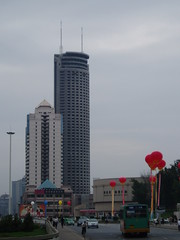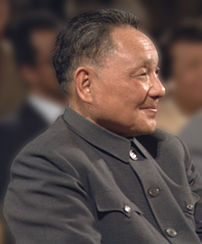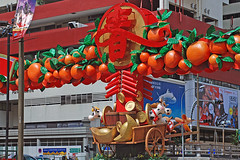Third day of the new year in Beijing
Really deafening when you are in the middle of it!
 |
 Image by mtlp via FlickrReal estate in China is expected to rebound over the coming twelve months as the central government is reversing its policies, writes real estate guru Sam Crispin in a newly released CPIM report.
Image by mtlp via FlickrReal estate in China is expected to rebound over the coming twelve months as the central government is reversing its policies, writes real estate guru Sam Crispin in a newly released CPIM report.CPIM expect most of the government measures brought in to control the property market since 2004 to be reversed in stages. Despite a number of negative factors and declines forecast not all sectors, segments and locations are behaving in the same way.
In the Bohai Bay Area of China some cities are seeing half the number of buyers in while in others transactions are only 11% down. Tianjin and Beijing prices almost unchanged over the full year in 2008. Average land prices closed at Rmb1,380 per sq.m in Tianjin, almost 42.5% down from the previous year.
Other regions in southern parts of China showed a more negative trend, the report says.
Overall, government intervention to support the market give CPIM cause for optimism. ‘It isn’t everything, but government support in the socialist market economy counts for an awful lot, municipal governments are already moving to mop up some of the surplus inventory’ commented Mr Crispin who has been working in China real estate since 1994. At the very least Chinese banks are still standing and still lending is a key point of difference with many other markets around the world.The full report can be found here.
 Sam Crispin
Sam Crispin
 Image by Fons1 via FlickrShaun Rein of the China Market Research Group (CMR) explains to the newswire Bloomberg why he remains cautiously optimistic about consumer spending in China, although the number of optimists in China dropped from 70 percent in December to 60 percent now.
Image by Fons1 via FlickrShaun Rein of the China Market Research Group (CMR) explains to the newswire Bloomberg why he remains cautiously optimistic about consumer spending in China, although the number of optimists in China dropped from 70 percent in December to 60 percent now.
 Shaun Rein
Shaun Rein Maria Korolov
Maria Korolov
 Deng Xiaoping would be upset
Deng Xiaoping would be upsetYou see interviews with princelings recounting their memories of their fathers displayed prominently on the website. Even Mao Xinyu, the grandson of Chairman Mao (left), is trotted out frequently. The latest item goes too far, I think. First of all, instead of "princelings," they are now called "red descendants." Eh, doesn't that sound a bit like the "blood line theory," which dominated early Red Guard discourse back in the Cultural Revolution (slogan: father a hero, son good man; father reactionary, son turtle's egg). These "red descendants" are collectively wishing the Chinese people happy new year. Great! So now it's officially okay to admit that "red descendants" is a coherent social group, one that is to be admired by the people.Back in the 1980s those people would have gotten into trouble with former leader Deng Xiaoping and princelings would have to actually hide their connections, writes Shih.
Even Bo Xicheng, Bo Xilai's elusive brother, makes an appearance. Look, this looks suspiciously like the princelings' play at building up more legitimacy for themselves in preparation of Xi Jinping's takeover. It is sad to see because Chen Yun and even Xi Zhongxun himself would never have allowed such abuse of these ties in the public discourse. Where is Song Ping when you need him?Commercial
 Victor Shih
Victor Shih
 Image by chooyutshing via FlickrEvery animal in the Chinese zodiac seems to have a hang-up. Is it the year of the rat or - because of the perceived evilness in the West of the rat - should it be rather called the year of the mouse? The new year has a similar problem. Is it the Year of the Ox, or should the economically inclined call it the Year of the Bull.
Image by chooyutshing via FlickrEvery animal in the Chinese zodiac seems to have a hang-up. Is it the year of the rat or - because of the perceived evilness in the West of the rat - should it be rather called the year of the mouse? The new year has a similar problem. Is it the Year of the Ox, or should the economically inclined call it the Year of the Bull. Marc van der Chijs
Marc van der ChijsThe business model we have is focused on advertising revenue. We also work on a revenue-share basis to promote webgames and MMORPGs. I use China as a testing ground for new things. I think China is ahead of the rest of the world in terms of games. In-game items and the free-to-play model all originally came from China. Our first mobile gaming site worldwide was part of the Chinese website here. We also recently started a webgame portal. We run these games ourselves with our own payment systems and everything. Before, our portals were only advertising-based but now we use the pay-for-item model as well for our webgames.Van de Chijs is very critical about the advertisement agencies, he mostly qualifies as "lazy". Spil's business model depends mostly on advertising and revenue sharing with other games and very limited in-game ads. Marc van der Chijs:
We do have in-game ads, but it is very limited still. In China, it is very difficult to find in-game advertisers because the advertising agencies are too lazy to sell these things. It's a small market for sure and they would need to invest a lot of time to do it. Even online ads are difficult in China because agencies just don’t want to sell them to their customers; it's easier for them to keep working with TV ads.More at Pacific Epoch.

 Rupert Hoogewerf
Rupert Hoogewerf
 Andrew K.P. Leung
Andrew K.P. Leung Image by Getty Images via DaylifeThe China Speakers Bureau has sent out its newsletter for January 2009, with some predictions by our speakers on what to expect for 2009. Expected theme for the February 2009 newsletter: what is Barack Obama going to mean for the relations between China and the US? Click here to see our newsletter.
Image by Getty Images via DaylifeThe China Speakers Bureau has sent out its newsletter for January 2009, with some predictions by our speakers on what to expect for 2009. Expected theme for the February 2009 newsletter: what is Barack Obama going to mean for the relations between China and the US? Click here to see our newsletter. Kaiser Kuo
Kaiser Kuo Arthur Kroeber
Arthur Kroeber"The message is clear: China's heavy industry sector is plagued by over-capacity and will need to readjust to a significantly weaker demand pattern than was anticipated a year ago."In less than a decade the steel output grew from 100 million tonnes to 570 tonnes and now fell back to a more sustainable 400 tonnes. Kroeber expects a soft landing but by now means an easy or short landing.
He says that hidden debt in China's corporate sector is higher than revealed by official bank-loan data, since 44 per cent of corporate capital expenditure in 2008 was financed by money whose source is literally unknowable.Commercial
Industrialisation, urbanisation and thus growth will continue, he stresses, but subject to gradually increasing constraints -- some demographic (due to the rapid ageing of the population) and environmental, others the results of deliberate government policy.
Of concern to Australia, Kroeber predicts that the resource intensity of China's growth will be far lower in the next five years than it was in the last five as a result of industrial consolidation, slower growth, and efficiency improvements.

 Paul Denlinger
Paul DenlingerBefore I landed in Shanghai in 1998, even after four years of living in Hong Kong, my world view was "typically American." It's difficult for non-Americans to appreciate the sense of exceptionalism we grow up with. From Ronald Reagan's stirring references to the United States as a "shining city on a hill" to civil studies that represented American democracy as the culmination of Western history, we were raised with a quasi-religious belief in Jeffersonian ideals - an inalienable right to the pursuit of happiness rooted in individualism - as the destiny of all mankind. For the past ten years, however, my job has been to advertise both Western and Chinese products to the Chinese. Some call me a sell out or, even worse, an abettor of dictators. Regardless, I quickly learned that brands must align themselves with a Chinese world view, lest they sacrifice both revenue and profit on the altar of cultural absolutism.Much more at the Huffington Post.

 Rupert Hoogewerf
Rupert Hoogewerf"In the two months from early September to early November, the average wealth of the richest who own listed companies shrank by 45 percent, after an over-20 percent fall earlier in 2008," said Rupert Hoogewerf, chairman of luxury publishing group Hurun Report, which releases the Hurun Rich List of Chinese tycoons and entrepreneurs annually.Their wealth had already been hit by a dropping stock market in early 2008, hitting their wealth with an average 20 percent.
"Surprisingly, the rich we surveyed said that their average spending this year was two million yuan, which is significantly less than I expected," Hoogewerf said.Many more details at the China Daily.
International media usually report that the rich in China spend four to five million yuan a year, he added.

 Sam Flemming
Sam Flemming
 Zhang Lijia
Zhang Lijia
 Charles McElwee
Charles McElwee“The Xiamen government has now reached a consensus with Tenglong’s parent Xianglu Group to relocate the project. It has promised to pay compensation to Xianglu after the decision was approved by the central government.” Huh, why does Xiamen owe any compensation to Xianglu in this matter?Commercial
Its clear that Tenglong and its parent Xianglu feel confident enough (that means connected enough) to play hardball. That makes the accomplishments of the citizenry of Xiamen in forcing this move even more remarkable.
